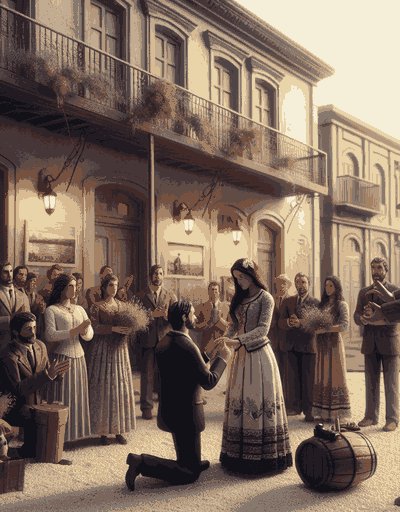Uruguay Wedding Traditions Cultural Wedding Guide 2025
Uruguayan wedding traditions are a unique blend of European influences, indigenous customs, and progressive secular practices that create celebrations lasting 1-3 days and typically involving 80-200 guests. These traditions encompass mandatory civil ceremonies, elaborate Mesa DulceMEH-sah DOOL-seh dessert tables, all-night receptions, and the iconic asadoah-SAH-doh barbecue, creating distinctly Uruguayan celebrations that honor both tradition and contemporary values.

Complete Uruguayan Wedding Process Overview

The traditional Uruguayan wedding timeline includes:
- 12-18 months before: Compromisokom-pro-MEE-soengagement announcement
- 6-12 months before: Civil ceremony planning and venue selection
- 3-6 months before: Send formal invitations (tarjetas de invitacióntar-HEH-tas deh een-vee-tah-see-OHN)
- 1-3 months before: Pre-wedding celebrations and family gatherings
- Wedding week: Mandatory civil ceremony at Registro Civilreh-HEES-tro see-VEEL
- Wedding day: Religious/symbolic ceremony followed by reception
- Reception: All-night celebration with asadoah-SAH-doh, Mesa DulceMEH-sah DOOL-seh, and dancing
Pre-Wedding Traditions and Ceremonies

What is Compromiso (Uruguayan Engagement)?
Compromisokom-pro-MEE-so is the formal engagement announcement tradition dating back to colonial times when Spanish and Portuguese families arranged marriages. This centuries-old practice involves a formal family gathering where the groom requests the bride’s hand, emphasizing family approval and community recognition.
Modern compromiso celebrations include:
- Formal family gathering: 20-50 close relatives
- Ring exchange: Both partners wear engagement rings on right hands
- Costs: $500-$2,000 USD for hosting the event
- Timeline: Typically held 12-18 months before wedding
Regional variations of compromiso:
- Montevideo: Sophisticated urban venues, cocktail receptions
- Rural areas: Traditional home gatherings with asadoah-SAH-doh
- Coastal regions: Beachside celebrations in Punta del Este
- Wine regions: Vineyard settings in Canelones
Wedding Invitations (Tarjetas de Invitación)
Tarjetas de invitacióntar-HEH-tas deh een-vee-tah-see-OHN are formal wedding announcements following specific Uruguayan protocols. These elaborate invitations traditionally list both sets of parents as hosts, followed by the couple’s names and details for both civil and religious ceremonies.
Traditional invitation elements:
- Formal wording: Spanish language with honorific titles
- Parent names: Listed as official hosts (unless couple hosts)
- Dual ceremony details: Civil and religious/symbolic times
- RSVP information: Response cards included
- Cost: $3-8 USD per invitation set
Pre-Wedding Celebrations in Uruguay
Despedida de solterodes-peh-DEE-dah deh sol-TEH-ro/soltera (bachelor/bachelorette parties) in Uruguay focus on meaningful friendships rather than extravagance. These celebrations typically involve 10-20 close friends and cost $50-200 USD per person.
Traditional pre-wedding events include:
- Family asados: $500-$1,500 USD for 30-60 people
- MateMAH-teh circles: Intimate gatherings of 5-10 people
- Folk dance events: Rural areas featuring pericónpeh-ree-KOHN or milongamee-LOHN-gah
- Urban celebrations: Montevideo trendy venue parties
Official Wedding Ceremonies

What is Matrimonio Civil (Civil Ceremony)?
Matrimonio civilmah-tree-MOH-nee-oh see-VEEL is Uruguay’s mandatory civil wedding ceremony required by law before any religious or symbolic celebration. This legal requirement, established in the early 1900s under President José Batlle y Ordóñez, reflects Uruguay’s strong secular tradition and separation of church and state.
Civil ceremony requirements:
- Location: Registro Civilreh-HEES-tro see-VEELcivil registry office
- Witnesses: 2-4 legal witnesses required
- Duration: 15-30 minutes
- Cost: $100-300 USD in government fees
- Attendees: Typically 10-30 close family members
The civil ceremony serves as an equalizer across all social classes and geographic regions, making it Uruguay’s most enduring wedding tradition.
Libreta de Matrimonio (Marriage Booklet)
Libreta de Matrimoniolee-BREH-tah deh mah-tree-MOH-nee-oh is the official marriage record booklet issued immediately after the civil ceremony. This legal document serves as permanent proof of marriage and will later include records of children and other significant family events.
Religious and Symbolic Ceremonies
Following the mandatory civil ceremony, 65% of Uruguayan couples choose additional ceremonies:
Catholic ceremonies remain most common, particularly among traditional families:
- Duration: 45-60 minutes
- Cost: $500-$2,000 USD including church fees
- Guests: 80-200 attendees
- Popular venues: Historic churches in Montevideo and Colonia
Secular ceremonies reflect Uruguay’s progressive society:
- Popularity: Growing to 30% of couples in urban areas
- Flexibility: Customizable vows and rituals
- Venues: Gardens, beaches, historic sites
- Cost: $300-$1,500 USD for officiant and venue
Traditional Wedding Ceremony Elements
What is La Entrega (The Giving Away)?
La Entregalah en-TREH-gah is the Uruguayan tradition where both parents accompany the bride down the aisle, symbolizing full family blessing and support. This practice emphasizes the importance of family bonds and differs from North American traditions of only the father escorting the bride.
Current practice statistics:
- 85% of traditional weddings maintain this custom
- Urban variations: Some couples include stepparents or guardians
- Symbolic meaning: Represents united family support
- Duration: 2-3 minute processional
Los Testigos (Wedding Witnesses)
Los Testigoslohs tes-TEE-gohs are official wedding witnesses with legal responsibilities rather than ceremonial roles like bridesmaids or groomsmen. Each couple typically chooses 1-2 witnesses who sign marriage documents during the civil ceremony.
Witness responsibilities:
- Legal role: Sign official marriage register
- Selection: Close friends or family members
- Number: 2-4 total (1-2 per person)
- Gifts for witnesses: $50-200 USD per person
Arras Matrimoniales (Wedding Coins)
Arras matrimonialesAH-rahs mah-tree-moh-nee-AH-les are thirteen gold coins presented by the groom to the bride during traditional ceremonies with Spanish heritage. This colonial-era tradition symbolizes the groom’s promise to provide and the couple’s commitment to share worldly goods.
Modern arras practices:
- Practiced by: 40% of couples with Spanish heritage
- Coin options: Family heirlooms or newly minted
- Cost: $200-$1,000 USD for gold coins
- Presentation: Special decorative box or tray
Reception Traditions
El Brindis (The Toast Tradition)
El Brindisel BREEN-dees is the lengthy cocktail reception featuring Uruguay’s wine culture, particularly Tannat, the national grape variety. This tradition allows 1-2 hours of toasting and socializing between ceremony and dinner.
Typical brindis elements:
- Duration: 60-120 minutes
- Wines served: 3-5 varieties, emphasizing Tannat
- Appetizers: 8-12 varieties of regional specialties
- Cost: $15-40 USD per person
- Guest participation: Multiple toasts from family and friends
Regional brindis variations:
- Montevideo: Sophisticated wine and cocktail pairings
- Canelones wine region: Local vintage showcases
- Punta del Este: Champagne and seafood focus
- Rural areas: Traditional mateMAH-teh and local spirits
What is Mesa Dulce (Sweet Table)?
Mesa DulceMEH-sah DOOL-seh is Uruguay’s traditional dessert table featuring 20-40 varieties of sweets instead of a single wedding cake. This abundant display reflects European immigrant influences combined with Uruguay’s beloved dulce de lecheDOOL-seh deh LEH-cheh traditions.
Mesa Dulce typically includes:
- Dulce de leche desserts: 8-12 varieties
- Italian pastries: Cannolikah-NOH-lee, sfogliatellesfo-lyah-TEL-leh, tiramisutee-rah-mee-SOO
- Spanish sweets: ChurrosCHOO-rohs, flanflahn, torrijastoh-REE-hahs
- Local specialties: Alfajoresahl-fah-HOH-res, chajáchah-HAH, pasta frolaPAHS-tah FROH-lah
- Cost: $8-20 USD per guest
- Professional setup: $500-$2,000 USD for designer displays
Asado de Casamiento (Wedding Barbecue)
Asado de casamientoah-SAH-doh deh kah-sah-mee-EN-toh is the traditional Uruguayan wedding barbecue central to rural celebrations and increasingly popular in urban weddings. This quintessentially Uruguayan tradition showcases the country’s cattle-raising culture and communal dining values.
Traditional asadoah-SAH-doh includes:
- Meat selection: 400-600 grams per person
- Duration: 3-4 hours of cooking and eating
- Asadorah-sah-DOHRgrill master: Respected family member
- Cost: $25-50 USD per person
- Guests served: 50-300 people
Regional asado variations:
- Rural areas: Traditional cuts, wood-fired grills
- Coastal regions: Seafood additions to beef
- Urban settings: Gourmet presentations, professional catering
- Wine regions: Paired with local vintages
Entertainment and Celebrations
Caravana de Autos (Car Procession)
Caravana de autoskah-rah-VAH-nah deh OW-tohs is the joyful car procession following newlyweds from ceremony to reception with decorated vehicles and enthusiastic horn-honking. This public celebration announces the marriage throughout the community.
Procession details:
- Vehicles involved: 10-30 decorated cars
- Route: Through main streets for public visibility
- Duration: 15-30 minutes
- Decorations: Ribbons, flowers, “Just Married” signs
- Most popular in: Smaller communities and rural areas
Traditional Dances
Baile del PericónBYE-leh del peh-ree-KOHN is Uruguay’s national folk dance performed at traditional weddings:
- Origin: GauchoGOW-choh culture and rural traditions
- Participants: 8-16 dancers in traditional dress
- Duration: 10-15 minute performance
- Cost: $300-$800 USD for professional troupe
- Regional popularity: 60% of rural weddings, 20% urban
La Cadenalah kah-DEH-nahChain Dance engages all wedding guests:
- Timing: Later evening celebration
- Participation: 80-100% of guests join
- Led by: Newlywed couple
- Duration: 15-20 minutes
- Music: Traditional or contemporary
La Tamborileada (Candombe Drums)
Tamborileada features Afro-Uruguayan candombekan-DOHM-beh drum performances, particularly popular in Montevideo weddings celebrating cultural diversity.
Performance elements:
- Drum ensemble: 3-8 performers
- Duration: 20-40 minute sets
- Cost: $500-$1,500 USD per group
- Popularity: 25% of Montevideo weddings
- Cultural significance: UNESCO-recognized heritage
Wedding Favors and Gifts
Almendras Confitadas (Sugared Almonds)
Almendras confitadasahl-MEN-drahs kon-fee-TAH-dahs are traditional wedding favors of sugared almonds given in odd numbers to symbolize the couple’s indivisible union. This European-rooted tradition remains popular across all regions.
Favor traditions:
- Quantity: 5 or 7 almonds per guest
- Packaging: Tulle bags or decorative boxes
- Cost: $2-5 USD per favor
- Modern variations: Local candies or chocolates
- Guest coverage: 100% of attendees receive favors
Ajuar de la Novia (Bridal Trousseau)
Ajuar de la noviaah-HWAHR deh lah NOH-vee-ah is the traditional collection of household items and linens the bride prepares for married life. While less elaborate than historical versions, modern ajuars maintain family connections.
Contemporary ajuar includes:
- Linens: High-quality bedding and towels
- Heirloom pieces: Family lace or embroidery
- Modern additions: Kitchen appliances, decor
- Investment: $1,000-$5,000 USD
- Preparation time: 6-12 months
Regional Wedding Variations
Montevideo Urban Weddings
Montevideo weddings represent 45% of Uruguay’s marriages with sophisticated urban influences:
- Average guest count: 150-200 people
- Venue preferences: Historic buildings, modern hotels
- Ceremony style: Mix of traditional and contemporary
- Reception cost: $80-150 USD per person
- Popular months: March-May, September-November
Punta del Este Coastal Celebrations
Punta del Este weddings feature beach and resort settings:
- Season: December-March summer months
- Guest count: 100-300 including destination guests
- Venue costs: $3,000-$10,000 USD
- Unique elements: Beach ceremonies, seafood emphasis
- International influence: 30% include foreign guests
Rural Traditional Weddings
Rural Uruguayan weddings maintain strongest traditional elements:
- Guest count: 200-400 community members
- Venue: Family estanciases-TAHN-see-ahs or community centers
- Cost: $30-60 USD per person
- Duration: Often 2-day celebrations
- Traditional elements: GauchoGOW-choh attire, folk dances, extensive asados
Modern Uruguayan Wedding Trends 2025
Sustainable Wedding Practices
Eco-friendly weddings have grown 40% since 2020:
- Local sourcing: 80% food and flowers from 50km radius
- Waste reduction: Composting, reusable decorations
- Carbon offsetting: For destination guest travel
- Digital elements: E-invitations saving paper
- Cost impact: 10-15% increase for sustainable options
Intimate Celebrations
Micro-weddings with 50 or fewer guests represent 25% of 2025 weddings:
- Cost savings: 50-70% lower than traditional weddings
- Venue flexibility: Private homes, small vineyards
- Personalization: Custom experiences for each guest
- Quality focus: Premium food and beverage offerings
- Extended celebrations: Weekend-long events
Technology Integration
Modern couples incorporate technology while maintaining tradition:
- Live streaming: For distant relatives (30% of weddings)
- Wedding apps: Custom apps for 20% of large weddings
- Digital guest books: Video messages from attendees
- Social media: Dedicated hashtags and sharing stations
- Professional documentation: Drone footage, 360-degree cameras
International Influences
Some Uruguayan couples blend local traditions with global trends:
- Destination weddings within Uruguay: 35% choose locations outside their home city
- Cultural fusion menus: Combining asadoah-SAH-doh with international cuisines
- Entertainment variety: DJs alongside traditional musicians
- Ceremony personalization: Writing own vows in 40% of secular ceremonies
- International vendor inspiration: Researching global wedding trends while maintaining Uruguayan core elements
Wedding Costs in Uruguay 2025
Average Total Wedding Costs
Traditional Uruguayan weddings cost between $10,000-$30,000 USD total:
- Civil ceremony: $100-300 USD
- Religious/symbolic ceremony: $500-$2,000 USD
- Reception venue: $2,000-$8,000 USD
- Catering with asadoah-SAH-doh: $4,000-$12,000 USD
- Mesa DulceMEH-sah DOOL-seh: $800-$3,000 USD
- Entertainment: $1,000-$3,000 USD
- Photography/videography: $1,500-$4,000 USD
- Flowers and decorations: $1,000-$3,000 USD
- Attire: $1,000-$3,000 USD
- Favors and extras: $500-$1,500 USD
Cost Variations by Region
- Montevideo: 20-30% higher than national average
- Punta del Este: 50-100% higher during peak season
- Rural areas: 30-40% lower than urban costs
- Wine regions: Competitive with rural pricing plus venue fees
This comprehensive guide to Uruguayan wedding traditions showcases how these customs blend historical European influences with progressive modern values, creating celebrations that honor family, community, and national identity while embracing contemporary adaptations.
Frequently Asked Questions
Is a civil ceremony required for marriage in Uruguay?
Yes, a civil ceremony at the Registro Civil is legally mandatory in Uruguay before any religious or symbolic ceremony can take place.
What is Mesa Dulce and why is it important?
Mesa Dulce is a traditional dessert table featuring 20-40 varieties of sweets. It's a crucial element of Uruguayan weddings, symbolizing sweetness in marriage and abundance.
How much does a typical Uruguayan wedding cost?
A typical Uruguayan wedding costs between $10,000-$30,000 USD, including ceremonies, reception, food, and entertainment.
What is the traditional wedding asado?
The wedding asado is a traditional Uruguayan barbecue reception featuring various grilled meats, lasting 3-4 hours and costing $25-50 per person.
How long before the wedding should couples start planning?
Couples typically begin planning 12-18 months before the wedding, starting with the compromiso (engagement announcement).
What are arras matrimoniales?
Arras matrimoniales are 13 gold coins presented by the groom to the bride, symbolizing shared prosperity and commitment.
How many witnesses are required at an Uruguayan wedding?
Uruguayan weddings require 2-4 legal witnesses (los testigos) to sign the marriage documents.
What is the typical guest count at Uruguayan weddings?
Uruguayan weddings typically host between 80-200 guests, depending on family size and budget.
Are both religious and civil ceremonies common?
While civil ceremonies are mandatory, many couples also choose religious or symbolic ceremonies to celebrate their union.
What is the traditional wedding favor in Uruguay?
Almendras confitadas (sugared almonds) are traditional wedding favors, with 5 or 7 almonds given to each guest.